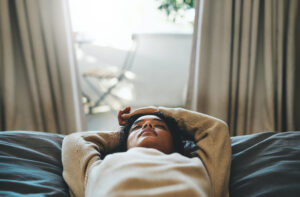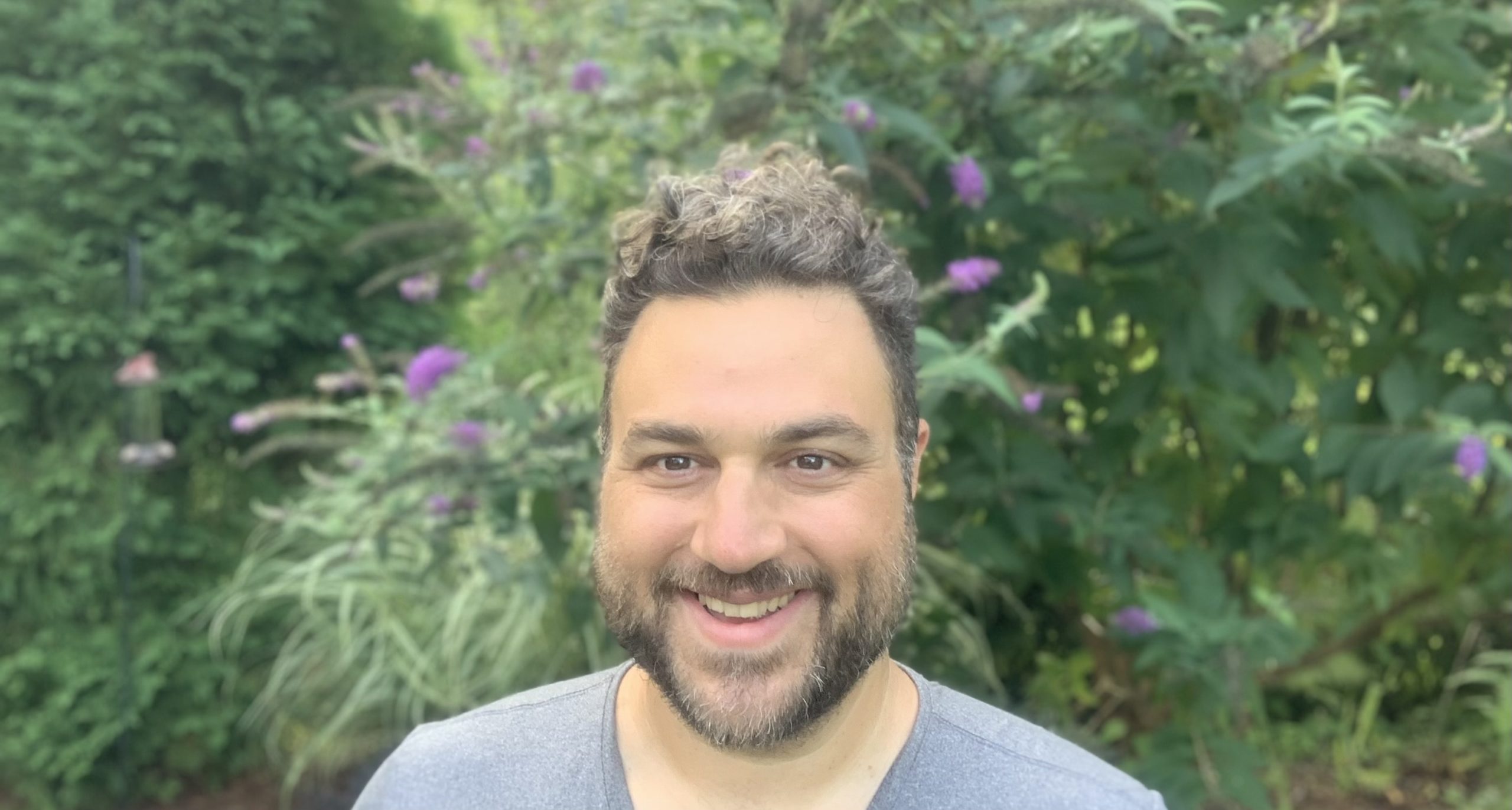Getting a good night’s rest is essential. However, for many people, getting to sleep – and staying asleep – isn’t as easy as it sounds. This is particularly common among people who experience anxiety. Our brains trigger false alarms that may be intense, frequent, and sometimes continuous in anxiety. These false alarms lead to some difficulties, particularly around the sleep-wake cycle. Indeed, various surveys point out that the prevalence of anxiety among people with insomnia is between 24 to 36 percent.
What is sleep anxiety?
Many of us deal with feelings of restlessness or worry, and it often seeps into the nighttime, making it hard to go to sleep or stay asleep. Some of us experience sleep anxiety, which can result from the fear of going to sleep at night – also known as somniphobia. In this case, we may think something terrible will happen while we’re asleep. In other cases, we might feel anxious before bedtime because we’re afraid we won’t get the rest we need.
Keep reading to learn more about sleep anxiety and how to manage it.
The sleep anxiety loop
If you are plagued with worry before bedtime, odds are you will experience difficulties falling and staying asleep. Overthinking and overly worrying have been identified as key factors behind insomnia. People with anxiety tend to have higher sleep reactivity, which means they’re more likely to experience sleep disturbance when stressed.
Even after (finally) falling asleep, people with sleep anxiety may wake up in the middle of the night feeling overwhelmed. Research shows that anxiety can change sleep cycles. Rumination before bedtime may affect rapid eye movement, which is when the most vivid dreams occur. Anxiety can lead to disturbing dreams and reinforce negative associations around going to sleep.
As Dr. Jud Brewer points out, this is a classic example of an anxiety habit loop. He explains that habits are built of three elements – a trigger, a behavior, and a result. In the case of sleep anxiety, if we tried mapping the habit loop, it would look something like this:
Trigger: Trying to sleep
Behavior: Ruminating – worrying about going to sleep
Result: Sleep disturbances
This sleep anxiety habit loop results in a lack of sleep, affecting emotional health and worsening anxiety symptoms. The sleep anxiety loop helps us see how worrying causes poor sleep, reinforcing the fear of falling asleep, which contributes to greater anxiety and further sleep disturbances.
These behaviors can become automatic without us noticing. Over time, we’re not consciously choosing these behaviors anymore, but they’ve become habits despite being unhelpful for us.
How to sleep better with anxiety
Fortunately, as we become aware of these habit loops, we can train our brains to step out of the cycle. Because the relationship between anxiety and sleep is so tight, anxiety habit loops can be a good place to start since we can work with any habit loop.
As Dr. Brewer points out: “The way our brain works isn’t the problem; it’s wired to form habits.” Instead, we can learn how our brain forms habits to use this same power to build helpful ones. Here are a few practices you can incorporate into your nighttime schedule to sleep better with anxiety.
Breaking sleep anxiety cycles
The first step in sleeping better with anxiety is learning how our sleep anxiety loops work. To do this, we have to map out the anxiety cycle:
The trigger is what starts the cycle. It can be external, like a noise or a light in your bedroom, or internal, like feeling overwhelmed or over-thinking.
This cues in behavior, which is the habit itself. In this case, it would be not falling asleep, distracting yourself with your phone, or even avoiding going into your bedroom altogether.
And finally, you land on the result or reward, which is how you feel after the behavior. Sometimes, you may experience some short-term relief from your feelings of worry when we successfully distract ourselves with something like scrolling through social media. However, in the long run, you may still experience sleep disturbances that interfere with your ability to get a good night’s sleep.
Brewer suggests using the brain’s reward-based learning system to unwind the sleep anxiety loop. According to him, our brain assigns “reward values” to our behaviors. The more rewarding the brain thinks the behavior is, the stronger the habit around it will be.
However, these reward values can become outdated. But, we can update the way the brain measures relative rewards by becoming aware of all the results of unhelpful habits and how they feel. We can also update the brain’s reward value by noticing all the results of helpful, more rewarding behaviors and how they feel. Through mindfulness and awareness, we can pinpoint the behaviors that no longer serve us and update our brain’s reward system with new behavior.
Practicing healthy sleep habits
Building healthy sleep habits and having a healthy sleeping environment are critical parts of sleep hygiene. To develop healthy sleep habits, we have to focus on developing good sleep hygiene by:
- Creating a positive sleep environment: Having a comfortable mattress and pillow, using bedding that feels good, and sleeping in a quiet, dark bedroom is essential to creating a space that invites sleep. Likewise, adjusting the room temperature, so it’s neither too hot nor too cold can help improve sleep quality.
- Setting a sleep schedule: Your body’s circadian rhythm regulates sleep cycles. Establishing a time for going to sleep and waking up daily can help regulate your circadian rhythm. It’s crucial to follow this sleep schedule, even on weekends. Having a sleep routine involving calming activities before bedtime can help signal your body that it’s time for sleep.
- Practicing daily helpful habits: How you spend your day impacts your sleep. Throughout the day, exercising and eating a healthy diet can positively affect sleep quality. Avoid alcohol and caffeine in the evening. And exposing yourself to natural light throughout the day can help.
Trying different relaxation techniques
We cannot force ourselves to fall asleep; we can only create the conditions under which we are likely to fall asleep. By moving the focus of our attention from worry thoughts (that tend to increase anxiety and worry and wakefulness) to something more neutral such as the breath or body, we are likely to relax and increase the likelihood of drifting off to sleep. Deep breathing and guided meditation may help put your mind at ease before bedtime or if you happen to wake up during the night.
Practicing mindfulness training
Mindfulness training (MT) has shown efficacy for anxiety. We recently published a study in which individuals that reported worry interfering with sleep used a mindfulness-related app (Unwinding Anxiety) to reduce worry and improve sleep. Participants were evaluated via self-reported questionnaires one and two months after treatment initiation. Worry-related sleep disturbances (WRDs) decreased by 27 percent in one month. The study shows how MT can help increase emotional non-reactivity and decrease worry while reducing sleep disturbances.
With mindfulness training, the idea is that whenever you have an unhelpful thought (excessive worry), instead of becoming overwhelmed by it, you acknowledge it at the moment and allow it to pass without acting on it. This approach changes how you relate to these disruptive thoughts and prevent them from intensifying and causing you to become anxious.
Dr. Brewer shares a mindfulness exercise known as the body scan. The body scan is a meditation that helps develop concentration and awareness and helps with sleep.
The next time you have trouble sleeping, try listening to this body scan meditation:
Even if you don’t sleep, use the body scan meditation to rest in the present moment instead of ruminating and worrying.
How Unwinding Anxiety can help improve your sleep
Sleep problems are experienced by nearly 20 percent of Americans, and it’s extremely common among those with anxiety. Addressing your anxiety symptoms can help improve your sleep. Unwinding Anxiety is an app-based program based on clinically validated guided sessions and mindfulness training to help reduce anxiety. The program modules explain how to work with your mind to understand the ins and outs of anxiety as a habit.
Data from the Unwinding Anxiety program shows a 67% reduction in anxiety after three months in a study of anxious physicians. And data from a clinical trial of app-based mindfulness training shows a 27% reduction in worry-related sleep disturbances after two months.
With the program, you receive practical resources designed to help you change your relationship with anxiety, including:
- Easy-to-follow mindfulness training sessions
- Short videos and audios to guide you through understanding how anxiety works
- Customizable exercises and tools to help you try out these concepts
- Sleep practices
Sign up for a free trial of Unwinding Anxiety and test the first modules to see if the program is right for you. With consistent practice, you too, can start feeling less anxious and more like yourself.
Sources:
Lexico Dictionary. Anxiety.
Ford, D. E., & Kamerow, D. B. (1989). Epidemiologic study of sleep disturbances and psychiatric disorders. An opportunity for prevention?
National Institute of Mental Health. (2022) Anxiety Disorders.
Grupe, D. W., & Nitschke, J. B. (2013). Uncertainty and anticipation in anxiety: an integrated neurobiological and psychological perspective.
Kalmbach, D. A., Cuamatzi-Castelan, A. S., Tonnu, C. V., Tran, K. M., Anderson, J. R., Roth, T., & Drake, C. L. (2018). Hyperarousal and sleep reactivity in insomnia: current insights.
Kalmbach, D. A., Anderson, J. R., & Drake, C. L. (2018). The impact of stress on sleep: Pathogenic sleep reactivity as a vulnerability to insomnia and circadian disorders.
Kalmbach, D. A., Fang, Y., Arnedt, J. T., Cochran, A. L., Deldin, P. J., Kaplin, A. I., & Sen, S. (2018). Effects of Sleep, Physical Activity, and Shift Work on Daily Mood: a Prospective Mobile Monitoring Study of Medical Interns.
Judson Brewer. (2019). Mindfulness training for addictions: has neuroscience revealed a brain hack by which awareness subverts the addictive process?
Dr.Jud.com. Curiosity: Our superpower for everything from breaking bad habits to overcoming anxiety.
Okamoto-Mizuno, K., & Mizuno, K. (2012). Effects of thermal environment on sleep and circadian rhythm.
Potter, G. D., Skene, D. J., Arendt, J., Cade, J. E., Grant, P. J., & Hardie, L. J. (2016). Circadian Rhythm and Sleep Disruption: Causes, Metabolic Consequences, and Countermeasures.
Dr.Jud.com. Anchoring In The Present Moment Meditation.
Gao, May BS; Roy, Alexandra BA; Deluty, Alana BA; Sharkey, Katherine M. MD, PhD; Hoge, Elizabeth A. MD; Liu, Tao PhD; Brewer, Judson A. MD, PhD. Targeting Anxiety to Improve Sleep Disturbance: A Randomized Clinical Trial of App-Based Mindfulness Training.
Roy A, Druker S, Hoge EA, Brewer JA. Physician Anxiety and Burnout: Symptom Correlates and a Prospective Pilot Study of App-Delivered Mindfulness Training.



